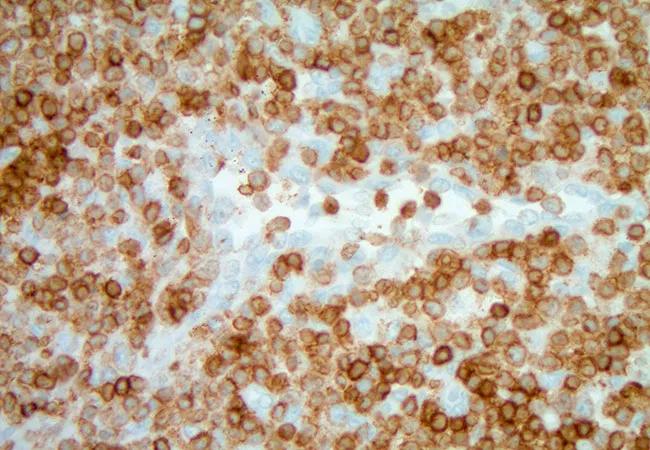Study findings presented at ASCO 2019

The ECHELON-2 trial, published in 2018, helped establish the efficacy of brentuximab vedotin (BV), in combination with chemotherapy, for treating CD30-positive peripheral T-cell lymphoma subtypes. The results of a new study, introduced at the 2019 American Society of Clinical Oncology Annual Meeting, invite questions about the association between the efficacy of BV, an anti-CD30 antibody drug conjugate (ADC), and the level of CD30 expression.
Advertisement
Cleveland Clinic is a non-profit academic medical center. Advertising on our site helps support our mission. We do not endorse non-Cleveland Clinic products or services. Policy
Deepa Jagadeesh, MD, first author of the study, is an oncologist at Cleveland Clinic and assistant professor at Cleveland Clinic Lerner College of Medicine. She presented her team’s findings that having CD30 levels that are <10% or absent, as detected through immunohistochemistry (IHC) stain, did not predict patients’ objective response to BV.
CD30 is a membrane protein of the tumor necrosis factor receptor family, and it plays a role in cell proliferation and apoptosis. While it can be expressed in healthy cells, its prevalence in multiple types of lymphoma cells has rendered it a chemotherapy target.
BV works by becoming internalized in the cell after binding to CD30, causing cell death. It is approved in the relapsed setting for Hodgkin’s lymphoma, CD30-positive cutaneous T-cell lymphoma (CTCL), and systemic anaplastic large cell lymphoma. In late 2018 it was also approved for upfront treatment of CD30-positive PTCL, in combination with chemotherapy, based on ECHELON-2 results.
Since patients with CD30 expression of <10% were not included in the ECHELON-2 trial, this study sought to find out whether this particular subgroup responded to BV. To do this, they analyzed data on 275 patients from five different studies on T-cell and B-cell lymphomas.
A total of 140 of these patients had tumors with CD30 expression of <10%, including 60 with undetectable expression. Findings showed that patients with PTCL, CTCL and B-cell lymphoma with low/undetectable CD30 expression responded to BV.
Advertisement
“It’s intriguing to see responses even in patients with zero CD30 expression, and some of the responses are durable,” says Dr. Jagadeesh.
Dr. Jagadeesh points to several evidence-based hypotheses that might explain the clinical activity seen in these patients who have low or no detected CD30 expression. One is that the current method for detecting CD30 by IHC stain may not be sensitive enough to detect all the cells expressing this marker. Another possible explanation is that there could be intrapatient variability in CD30 expression within biopsy samples.
An ongoing phase II clinical trial at Cleveland Clinic is seeking to determine the best method to measure CD30 expression and to identify the patient population that may benefit from this treatment.
T-cell lymphoma is a rare heterogeneous disease compared to B-cell lymphoma, comprising only 15% of non-Hodgkin’s lymphoma cases. Prognosis is poor in this entity as the overall survival rates are around 30-35% for the most common subtypes and 5-10% in some of the rarer subtypes.
“Because it is rarer, there is much less research related to T-cell lymphoma than to B-cell, so our knowledge about the disease biology is sparse,” says Dr. Jagadeesh.
She and her study team will be conducting further review of the data to better understand the relationship between CD30 expression and clinical response to BV. Hopefully ongoing research efforts will continue to identify novel agents that are active in T-cell lymphoma, and studies evaluating combination therapies will help improve outcomes in this disease.
Advertisement
Advertisement

Early results show strong clinical benefit rates

The shifting role of cell therapy and steroids in the relapsed/refractory setting

Radiation therapy helped shrink hand nodules and improve functionality

Standard of care is linked to better outcomes, but disease recurrence and other risk factors often drive alternative approaches

Phase 1 study demonstrates immune response in three quarters of patients with triple-negative breast cancer

Multidisciplinary teams bring pathological and clinical expertise

Genetic variants exist irrespective of family history or other contributing factors

Study shows significantly reduced risk of mortality and disease complications in patients receiving GLP-1 agonists